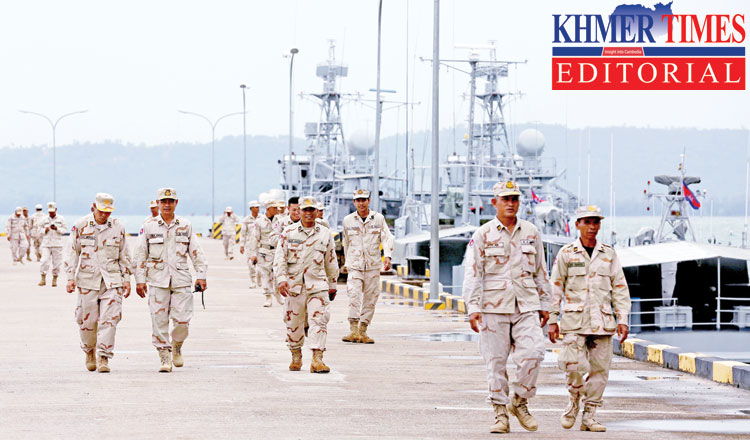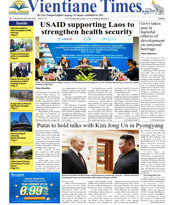OP ED EDITORIAL: DEMOCRACY-FREEDOM: PHONM PENH Cambodia- Why the US is so obsessed with Chinese military base in Cambodia?

The US is seen as too obsessed with the Ream naval base as well as any other facilities on the Cambodian coast that can harbour large ships and airplanes, military or commercial. Their accusation keeps changing from one spot to another.
There are four important traits for this obsession.
Firstly, the obsession is a by-default, a China paranoia and Sinophobia.

Fear of losing out to China in their hegemonic competition has made the US lose its cool and become restless, ready to pick up on any country, big or small, or anything that looks Chinese. The worst form of it being anti-Asian violence and racism in America.
Secondly, the US is adopting “Blocking everything Chinese” approach to contain China’s influence in Cambodia and elsewhere.
Kurt Campbell, President Joe Biden’s top official on Asian foreign policy already said that the period of US engagement with China is over, and is replaced by the period of “intense competition”.
Based on that approach, the US nitpicks Cambodia on every move the latter makes.
The US tries to block all Chinese economic activities and private investment in Cambodia, and any other political activities that Cambodia is conducting with China. Anything that Cambodia does with China is seen by the US as harmful to Cambodian national interest, sovereignty, and also affecting regional security.

For Cambodia, it just feels weird to see that: why America is so worried about Cambodia’s national interest and sovereignty more than Cambodia does?
Thirdly, the US must have hidden something in their donated building to Cambodia that it is extremely worried when Cambodia, who has sovereign ownership over the naval base, decided to do something else with the building.
Fourthly, the US wants an American base on Cambodian soil.
It is no secret that the US is hunting for more military bases to support its Indo-Pacific Strategy to contain China. For instance, it was reported that Palau has invited the US to build a military base on its territory while Pakistan rejected such request.
Cambodia is already fed up in explaining that it will never accept any foreign military base on its soil: neither Chinese nor American.

And Cambodia has walked the talk.
By continuously alleging and fabricating the presence of Chinese military base, Cambodia will bear the burden of proof, and the only way to clear that is to give the base rights to the US.
Because Cambodia’s explanation will never make sense. Because the US has the strongest power in shaping public opinion and perception. Because the US can use detergent as evidence to attack Iraq. Because the US will continue to nitpick Cambodia regardless of its explanations.
The question is: If the US’ satellites can catch the image of the building of that size, which Chinese naval ships and airplanes can escape the US’ eyes?
In fact, Cambodia’s explanations are never required.
The US will never be satisfied until it has its naked eyes stationed in Cambodian naval bases, and the best way to do that is to acquire base right on Cambodian soil.
As much as Cambodia feels hopeless in stopping the US’ nitpicking, Cambodia’s faintest hope is that there should be better ways for the US to keep an eye on China while maintaining stable relations with Cambodia.
It is understandable that the US loses nothing by cutting relations with Cambodia or by destroying Cambodia when it wants to show an example to the world in the hegemonic fight with China. And it seems the US is determined to do so by all possible means. And it has done so in the past, bombing and destroying Cambodia to the ground.
If any middle-ground advice can be taken, maybe the US can donate patrol ships with built-in US radar and surveillance system, that can automatically report back to Washington about who are trespassing Cambodian water, or conduct illegal fishing, drug trafficking, trafficking in persons, etc. That way the US can keep an eye on China without having to destroy Cambodia-US relations.
This is more productive and mutually beneficial.
If the US decides to do so, it is also advisable that the US provides something that are usable, and not the often very old second-hand military hardware, that cost so much to maintain, while bearing a high price-tag as US’ assistance to Cambodia.











